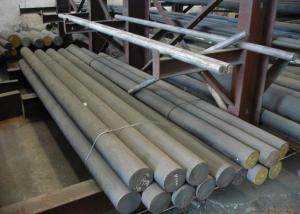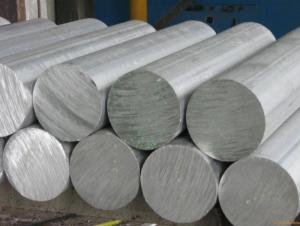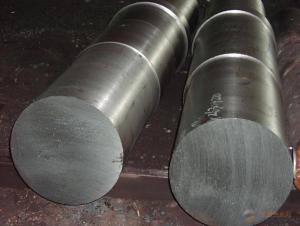Alloy Steel of Bearing
- Loading Port:
- Guangzhou
- Payment Terms:
- TT or LC
- Min Order Qty:
- 25MT m.t.
- Supply Capability:
- 600000 Tons/Year m.t./month
OKorder Service Pledge
OKorder Financial Service
You Might Also Like
Specifications of Alloy Steel For Bearing
1. Grade: AISI 52100, ASTM E52100, DIN 1.3505,JIS SUJ2, GCr15
|
100Cr6 |
52100 |
SUJ2 |
GCr15 |
|
100CrMo7 |
100CrMo7 |
SUJ5 |
GCr18Mo |
|
20CrMo4 |
4118H |
SCM418 |
G20CrMo |
|
20NICrMo2 |
8520H |
SNCM220 |
G20CrNiMo |
|
- |
- |
440C |
9Cr18 |
|
X108CrMo17 |
S44004 |
440C |
9Cr18Mo |
2. Specification: Diameter: 5.5~350mm Length: 2000-6000mm or as required
3. Steel Grade: Bearing Steel
4. Certification: ISO9001-2000; CE, UL
5. Inspection: 100% Ultrasonic according to the test standards: SEP1921-84, GR.3 CLASS C/C
6. Packing situation: standard seaworthy packing or as customer required
7. Heat treatment:
Soft annealing: heat to 680-720°C, cool slowly.
Hardness after annealing: Max. 241 HB
Hardening: 820 - 850 °C
Normalizing temperature: 840-880°C
Tempering: 540-680°
Usage and Applications of Alloy Steel For Bearing
Alloy steel is used in making all kinds of bearing ring and rolling elements, like combustion engine, machine tool, and bearings for melting machine; also used for making tools and measuring tools.
Bearing steels are used for ball and roller bearing applications and are comprised of low carbon steels and high carbon through harden able steel.
Alloy Steel can be used in machine parts and engineering components.
Applications range: Chemical fertilizer pipe, building, machinery, textile industry, etc
Packaging & Delivery of Alloy Steel For Bearing
Packaging Detail: Standard seaworthy packing or as customer required; Packed in bundles with standard export sea-worthy package or as customer require
Delivery Detail: 45 days after order confirmed
Delivery condition: Black, peeled, machined
Trade terms: FOB, CFR, CIF
MOQ: 25 tons or at customer's demands
Production Flow of Alloy Steel For Bearing
Process: EAF+LF+VD+ Hot Rolled(Forged)+ Heat Treatment (Annealed, A Normalized, Q+T)
The processing is hot rolled (strictly control sulphur, phosphorus and non-metallic inclusions content and distribution).
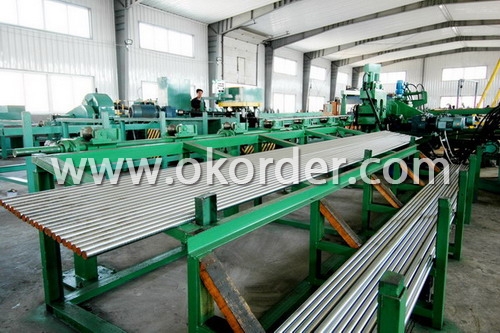
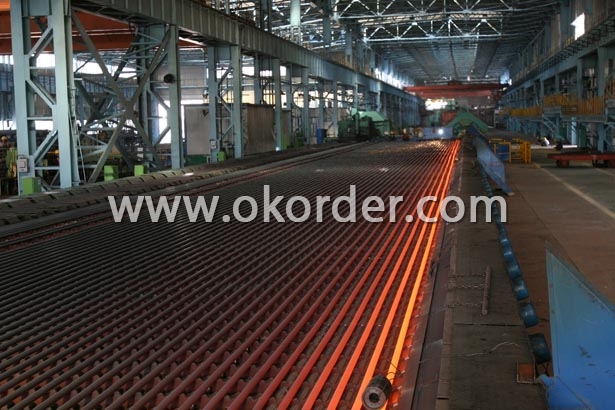
Product Advantages of Alloy Steel For Bearing
1. Good comprehensive properties
2. Good performance in cutting and processing after spheroids annealing
3. High hardness and homogenization after quenching and tempering
4. High abrasive resistance and fatigue resistance
5. Large amount of metal elements
6. High abrasion resistant SAE 52100 bearing steel
7. Steel GCr15 is the most widely used bearing steel
Quality Assurance of Alloy Steel for Bearing
We are the ISO 9001:2000 authentication enterprises and we can provide the enterprise's quality written guarantee for all the exported products.
Certificate of quality is issued in English, in addition the normal terms, production process, the mechanical property (yield strength, tensile strength, elongation and hardness. forged ratio, UT test result, Grain size, heat treatment methods and the sample of is shown on the certificate of quality.
- Q:How does special steel perform in welding applications?
- Special steel performs well in welding applications due to its high strength, excellent heat resistance, and superior weldability. Its unique composition and alloying elements allow for precise control of the welding process, resulting in high-quality, durable welds. Additionally, special steel's ability to resist cracking and deformation during welding ensures reliable performance and structural integrity in various applications.
- Q:What are the different types of heat-resistant steel?
- There are several different types of heat-resistant steel, including austenitic stainless steel, martensitic stainless steel, ferritic stainless steel, and nickel-based alloys.
- Q:How does molybdenum improve the performance of special steel?
- Molybdenum plays a crucial role in enhancing the performance of special steel due to its unique properties and characteristics. First and foremost, molybdenum significantly improves the strength and toughness of steel, making it more durable and resistant to deformation. This is achieved by forming a solid solution with iron, which results in a fine-grained microstructure and reduces the formation of brittle phases in the steel. Moreover, molybdenum increases the hardenability of steel, allowing it to be heat-treated to obtain desired mechanical properties. This is particularly important in the production of special steel, where high strength, wear resistance, and thermal stability are often required. By enabling effective heat treatment, molybdenum ensures that the steel can be processed to meet specific performance requirements, such as hardness, toughness, and dimensional stability. Additionally, molybdenum enhances the corrosion resistance of special steel, making it suitable for various challenging environments. It forms a protective oxide layer on the surface of the steel, which acts as a barrier against corrosive substances like acids, alkalis, and salts. This resistance to corrosion is crucial in applications where the steel is exposed to harsh conditions, such as marine environments, chemical processing plants, and oil and gas industries. Furthermore, molybdenum improves the high-temperature strength and creep resistance of special steel. It enables the steel to maintain its mechanical properties even at elevated temperatures, making it suitable for applications where the steel is subject to prolonged exposure to heat or mechanical stress. In summary, molybdenum plays a vital role in enhancing the performance of special steel by improving its strength, toughness, hardenability, corrosion resistance, and high-temperature properties. These attributes make molybdenum an essential alloying element in the production of special steel for various industries, including automotive, aerospace, energy, and tool manufacturing.
- Q:Can special steel be used in the textile industry?
- Yes, special steel can be used in the textile industry. Special steel, such as stainless steel, can be used in the production of various textile machinery components, including needles, pins, and loom parts. It offers durability, corrosion resistance, and strength, making it suitable for demanding textile manufacturing processes. Additionally, special steel can be used in the fabrication of textile machine frames and structures, providing the necessary stability and support.
- Q:What are the properties of wear-resistant stainless steel?
- Wear-resistant stainless steel possesses several key properties that make it a highly durable and reliable material. Firstly, it has a high hardness level, which helps it withstand abrasion and wear caused by friction. Secondly, it exhibits excellent corrosion resistance, protecting it from rust and other forms of degradation. Additionally, wear-resistant stainless steel has a high tensile strength, allowing it to withstand heavy loads and impacts without deforming or breaking. Lastly, it maintains its properties at elevated temperatures, making it suitable for use in high-temperature environments. Overall, these properties make wear-resistant stainless steel an ideal choice for applications that require strength, durability, and resistance to wear and corrosion.
- Q:What are the main characteristics of heat-resistant steel forgings?
- Heat-resistant steel forgings have several main characteristics. Firstly, they possess superior thermal stability, enabling them to maintain their strength and mechanical properties even at high temperatures. This is crucial in applications where the forgings are subjected to intense heat and thermal cycling, such as in jet engines or industrial furnaces. Secondly, they exhibit excellent oxidation and corrosion resistance, ensuring longevity and reliability in harsh environments. Additionally, heat-resistant steel forgings typically have high creep resistance, allowing them to withstand prolonged exposure to elevated temperatures without deformation. They are also known for their exceptional toughness and resistance to thermal fatigue, making them highly durable under extreme conditions. Overall, these characteristics make heat-resistant steel forgings essential components in industries requiring materials capable of withstanding demanding thermal conditions.
- Q:How does special steel perform in high-temperature creep?
- Special steel is specifically designed to perform well in high-temperature creep conditions. Creep refers to the tendency of a material to deform under constant stress over time at elevated temperatures. Special steel exhibits excellent resistance to creep due to its unique composition and heat treatment processes. The alloying elements used in special steel, such as chromium, nickel, and molybdenum, significantly enhance its high-temperature strength and creep resistance. These alloying elements form stable carbides and improve the material's ability to retain its structural integrity even at elevated temperatures. Furthermore, special steel is often subjected to specific heat treatment methods, such as annealing or quenching and tempering, to further enhance its creep resistance. These processes help in refining the microstructure of the steel, reducing the presence of internal stresses, and improving its overall mechanical properties. The combination of alloying elements and heat treatment processes in special steel provides it with exceptional creep resistance. It can withstand prolonged exposure to high temperatures without significant deformation or failure. This makes special steel an ideal choice for applications that involve high-temperature and high-stress conditions, such as gas turbines, petrochemical plants, and power generation facilities. Overall, the performance of special steel in high-temperature creep is outstanding, and it is widely recognized as a reliable and durable material for applications requiring resistance to thermal deformation and long-term stability under constant stress.
- Q:How is special steel tested for quality and performance?
- Special steel is tested for quality and performance through a variety of methods including chemical analysis, mechanical testing, hardness testing, and non-destructive testing. These tests help ensure that the steel meets the required specifications and standards, ensuring its reliability and performance in various applications.
- Q:What are the main factors affecting the strength of special steel?
- The main factors affecting the strength of special steel are the composition of alloying elements, heat treatment processes, and the grain size of the steel.
- Q:How does special steel contribute to the manufacturing of cutting blades?
- Special steel plays a crucial role in the manufacturing of cutting blades. Cutting blades are required to have exceptional strength, durability, and sharpness to efficiently perform their function. Special steel, also known as tool steel, possesses unique properties that make it an ideal material for manufacturing cutting blades. Firstly, special steel has excellent hardness, which enables cutting blades to maintain their sharpness for an extended period. Cutting blades made from special steel can withstand the wear and tear that occurs during cutting operations. This hardness allows the blades to retain their cutting edge, resulting in a longer lifespan and improved cutting performance. Moreover, special steel offers exceptional toughness, which is crucial for cutting blades. During cutting operations, blades are subjected to high impact and stress. Special steel's toughness helps absorb these forces and prevents the blades from breaking or chipping. This ensures that the cutting blades can withstand demanding cutting tasks without compromising their performance. Additionally, special steel provides excellent corrosion resistance. Cutting blades often come into contact with various materials, including moisture and chemicals. The corrosion resistance of special steel prevents the blades from rusting or corroding, ensuring their longevity and reducing the need for frequent replacements. Furthermore, special steel offers good machinability, making it easier to shape and form into the desired blade design. This enhances the manufacturing process by enabling the production of cutting blades with complex shapes and intricate features. The machinability of special steel allows manufacturers to create blades with precise cutting edges and optimal geometries, resulting in superior cutting performance. In conclusion, special steel contributes significantly to the manufacturing of cutting blades by providing hardness, toughness, corrosion resistance, and good machinability. These properties ensure that cutting blades made from special steel are long-lasting, durable, and capable of delivering exceptional cutting performance in various applications.
1. Manufacturer Overview |
|
|---|---|
| Location | Guangdong, China |
| Year Established | 2005 |
| Annual Output Value | Above US$ 100 Million |
| Main Markets | korea, India, Malaysia, Brazil, Germany, Belgium, Middle East |
| Company Certifications | |
2. Manufacturer Certificates |
|
|---|---|
| a) Certification Name | |
| Range | |
| Reference | |
| Validity Period | |
3. Manufacturer Capability |
|
|---|---|
| a)Trade Capacity | |
| Nearest Port | Guangzhou |
| Export Percentage | 50%-80% |
| No.of Employees in Trade Department | 21-100 People |
| Language Spoken: | English; Chinese |
| b)Factory Information | |
| Factory Size: | 23,000 square meters |
| No. of Production Lines | 1 |
| Contract Manufacturing | OEM servise offered |
| Product Price Range | high; average |
Send your message to us
Alloy Steel of Bearing
- Loading Port:
- Guangzhou
- Payment Terms:
- TT or LC
- Min Order Qty:
- 25MT m.t.
- Supply Capability:
- 600000 Tons/Year m.t./month
OKorder Service Pledge
OKorder Financial Service
Similar products
New products
Hot products
Related keywords

